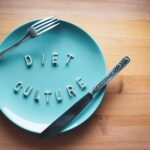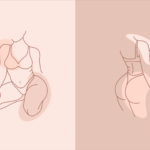How diet culture affect physical & mental health
It is almost considered ‘normal’ when you hear a friend say they want to lose weight, when you see someone in the office claiming to be on a diet or when you think that you’re bad because ‘bread is bad’ … thank you diet culture!
What is diet culture?
Diet culture is the belief that your appearance and body shape are more important than your physical and mental health, and we will explore the implications of this belief and how you can combat it in this post.
How is diet culture harmful?
Diet culture presents dieting as the only way to attain satisfaction with your body, but we know that this simply isn’t the case. Diet culture also perpetuates the myth that thinness equals healthiness, which is also far from true.
Dieting can create what is referred to as ‘the diet cycle’. The diet cycle in itself is a harmful phenomenon and can lead to shame and disordered eating. With dieting, it is considered ‘normal’ to be hungry and to not honour hunger, which can mean that we notice these hunger cues less frequently. With diet culture encouraging ignoring hunger cues, eating becomes routine and regimented, and we lose our ability to eat intuitively, which means you’re always on a diet!
Diet culture focusses on weight loss, rather than health. It is fashionable to be following a new diet, or to be seen choosing low calorie options rather than what you would like to actually eat. A recent survey highlighted that 35% of people in the UK follow some sort of ‘food rules’, with ‘low or no carb’ being the most popular (Statistic Global Survey, 2021).
Dieting, or having any kind of rules around food, can lead to disordered eating in many forms. It is interesting to note that the rate of disordered eating is higher among individuals with diabetes and within the athletic population, with researchers finding that this is linked to the emphasis on awareness of types and quantities of food (de Borja et al., 2021; Philippi et al., 2013).
Disordered eating is a risk factor for the development of eating disorders, such as Anorexia and Bulimia Nervosa (Bakalar et al., 2015). Diet culture also carries a weight stigma and idealises thinness, which are features associated with eating disorders.
Diet culture glamourises being ‘thin’, without taking into account the side effects that come with maintaining a very low weight or with dramatic weight loss. Maintaining a weight that is too low for your height can lead to:
- Loss of menstrual cycle which can severely impact bone density and lead to infertility
- Nutrient deficiency related conditions such as anaemia, brittle hair and nails
- Feeling cold, as the body does not have sufficient energy or fat stores to generate heat
- Low mood and energy
What alternatives are there to dieting?
There are alternatives to dieting, and these can range from being mindful of what you eat to embracing your body.
Acknowledging that health is not dictated by your weight can help you to question the need for you to diet. Health at every size (HAES) is an approach which aims to reduce weight stigma by encouraging healthy habits at every size and seeing that this is more important than a number on the scales or at the back of your jeans. Encompassing the principles of HAES, such as eating and moving for well-being and removing stigma around weight, can help combat diet culture too.
Another alternative to dieting is intuitive eating. Put simply, intuitive eating is a framework that embraces a mindset where you leave behind ‘good’ or ‘bad’ foods, and you make food choices based on what feels good for your body and gives you pleasure.
Are there any diets that are healthy?
Diet culture promotes fad diets such as Keto and the Atkins diet, and these can be harmful. As mentioned, diets that cut out specific food types don’t contribute to our physical or mental wellbeing.
A fad diet is rarely going to work, and you’re very likely to give it up, because often diets that cut out key food groups are simply unrealistic. Diets that do work come down to the principle of creating a negative energy balance, and this can be done through exercise, including more fruit and veg in our diets and less processed foods. You don’t have to cut out the foods you enjoy, despite what diet culture tells you!
The takeaway?
We have all been a victim of diet culture at some point and stepping away from it can be difficult but remember, you weren’t put on this earth only to diet, and you are worth so much more than your clothes size or that number on the scale.
If you would like support to break free from dieting, drop out of diet culture and learn how to trust your body once again, we are here to help! Book your no-strings-attached clarity call with one of our experts.
References
- Bakalar, J. L., Shank, L. M., Vannucci, A., Radin, R. M., & Tanofsky-Kraff, M. (2015). Recent advances in developmental and risk factor research on eating disorders. Current psychiatry reports, 17(6), 1-10.
- de Borja, C., Holtzman, B., McCall, L. M., Carson, T. L., Moretti, L. J., Farnsworth, N., & Ackerman, K. E. (2021). Specific dietary practices in female athletes and their association with positive screening for disordered eating. Journal of Eating Disorders, 9(1), 1-10.
- Erez, G., Tirosh, A., Rudich, A., Meiner, V., Schwarzfuchs, D., Sharon, N., … & Shai, I. (2011). Phenotypic and genetic variation in leptin as determinants of weight regain. International journal of obesity, 35(6), 785-792.
- Philippi, S. T., Cardoso, M. G. L., Koritar, P., & Alvarenga, M. (2013). Risk behaviors for eating disorder in adolescents and adults with type 1 diabetes. Brazilian Journal of Psychiatry, 35, 150-156.
- Statistia Global Survey, 2021; https://www.statista.com/forecasts/997894/diets-and-nutrition-in-the-uk














